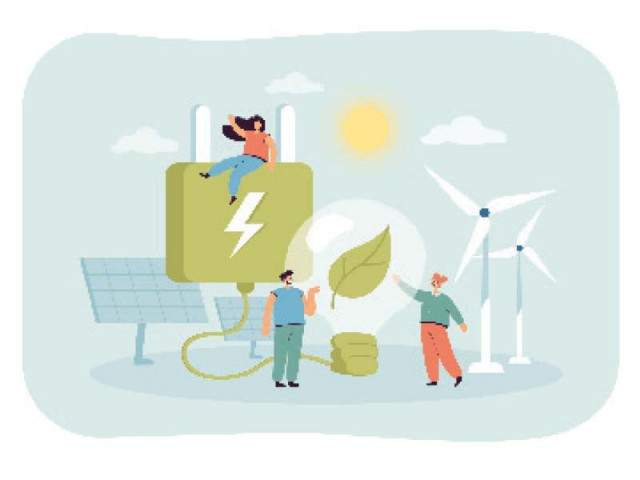Hurdles in import of solar equipment jeopardises renewable energy goals
Contradictory policies, port clearance delays impede progress towards energy targets

Despite the government’s announcement to fully reopen imports, solar equipment importers in Pakistan are still running from pillar to post in an attempt to get clearing for their equipment at domestic ports, particularly those originating from China.
Traders argue that while the government continues to prioritise energy imports, it discourages the import of clean energy-producing equipment, such as solar panels. While the import of renewable energy equipment has the potential to gradually, but significantly, cut fuel imports and save a massive amount of foreign exchange in the long-run, this contradiction in policies is hindering the growth of renewable energy in the country and jeopardising Pakistan’s target of increasing the share of renewable energy to 30% in the total power production by 2030.
The government has encouraged the establishment of local manufacturing plants for solar panels in the 2024 budget, but due to the capital-intensive nature of these plants, they remain unfeasible for smaller economies like Pakistan. As a result, the import of raw materials for solar equipment manufacturing is still necessary.
Speaking to The Express Tribune, Vice Chairman of the Pakistan Solar Association (PSA), Muhammad Zakir Ali expressed concerns about the delays in clearing imported equipment at domestic ports. Traders had initially opposed the central bank’s policy requiring importers to pay for the equipment on a one-year deferred payment basis. Eventually, they managed to secure investors in Dubai to finance the imports from China, with payment to be made after 365 days. In this backdrop, the traders imported the equipment which is yet to get clearance from the ports. However, the central bank recently revised its import policy, requiring importers to pay on a six-month deferred payment basis directly to the manufacturers in China instead of the financiers in Dubai.
Ali urged the government to provide a clear and long-term import policy for solar equipment to enable traders to operate smoothly. The abrupt changes in policy not only complicate doing business but also result in significant financial losses. He emphasised that liberalising the import of solar equipment could reduce the country’s energy import bill by approximately 30% within four to five years. Vested interest groups continue to misguide the government and have caused a massive slowdown in import of renewable energy equipment, lamented the PSA VC.
Reon Energy, Head of Operations, Saqib Zaidi highlighted the potential of solar equipment imports to eliminate the need for fuel imports (oil, gas, and coal) for power generation. He estimated that solar equipment imports equivalent to one-and-a-half years’ worth of fuel imports, estimated at $21-24 billion, could achieve this. Additionally, the longevity of solar equipment, with a lifespan of 25 years, ensures long-term benefits for the power sector.
However, the import of solar equipment has slowed down in FY23, amounting to $1 billion (equivalent to 1GW energy producing equipment) compared to $2 billion (2.4GW equipment) in FY22. This slowdown has impeded progress towards Pakistan’s target of increasing the share of solar energy in the energy mix to 30% by 2030. Ali stressed the urgent need for a shift away from using polluting fuels for power production, which not only contributes to climate change but has also led to recent flood warnings in the country.
While the government has announced incentives for setting up solar panel manufacturing plants in Pakistan, including duty and tax exemptions on raw materials, Ali emphasised the importance of providing a 10-year policy framework to attract investment. Zaidi added that establishing such manufacturing plants requires significant capital investment and a bulk of energy resources. “A project of producing equipment for 1GW energy in a year may cost Rs4-5 billion at present,” he said, adding Pakistan remains relatively a small economy on the scale to set up such capital and energy intensive plant.
In a letter to Prime Minister Shehbaz Sharif and Finance Minister Ishaq Dar, the Pakistan Solar Association expressed gratitude for the incentives but called for a favourable environment and policies to promote joint ventures with international technology companies. They also stressed the need to improve the ease of doing business and streamline bureaucratic procedures, which would attract more foreign investors and create a favourable business environment.
As Pakistan seeks to embrace renewable energy and reduce its dependence on fossil fuels, the government must provide consistent and supportive policies to enable the growth of the solar energy sector. This will not only contribute to sustainable development but also help achieve the country’s energy goals.
Published in The Express Tribune, July 9th, 2023.
Like Business on Facebook, follow @TribuneBiz on Twitter to stay informed and join in the conversation.



















COMMENTS
Comments are moderated and generally will be posted if they are on-topic and not abusive.
For more information, please see our Comments FAQ